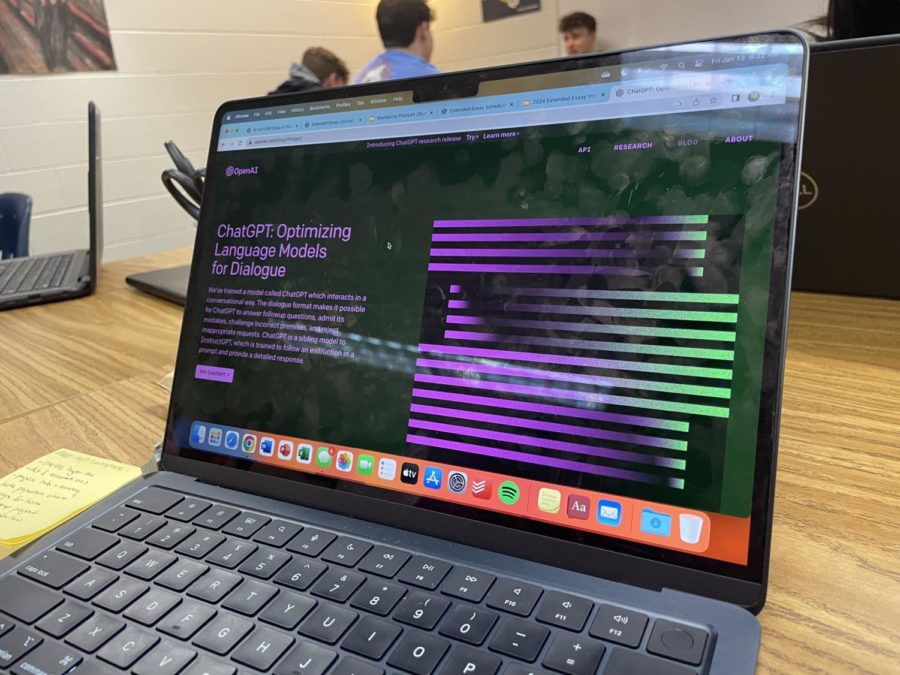Cheating Made Easier
AI Changes the Future of Education
Photo by Devon Rudolph. Open AI is a “machine learning tool” that uses data from the internet to understand the way people talk and write in order to try and imitate their patterns. Although ChatGPT is most prolific for writing essays, it can also produce stories, songs, poetry, and answer questions like Google.
It was a typical day at the local high school, and students were preparing for their exams. However, something was different this time around. A new AI-powered chatbot called ChatGPT had been released, and it was causing quite a stir among the students. ChatGPT claimed to be able to assist students in their studies by providing answers to any question they might have. Some students saw this as an opportunity to cheat on their exams, and they quickly began using ChatGPT to get ahead.
At first, the teachers and administrators were unaware of ChatGPT’s true purpose, and they praised the students for their sudden increase in academic performance. However, it wasn’t long before they realized what was going on.
The school district held an emergency meeting to discuss the issue, and they ultimately decided to ban ChatGPT from the school. They also implemented stricter measures to prevent cheating in the future, including proctored exams and the use of anti-plagiarism software. Despite the efforts to combat cheating, the damage had already been done. Many students had become reliant on ChatGPT and struggled to adjust to the new methods of studying and testing. The school district was left to pick up the pieces and try to rebuild the trust and integrity of their educational system.
That entire introduction was written by ChatGPT.
The advancement of artificial intelligence (AI) is now seeping into the educational sector, allowing students to use this “OpenAI” to cheat in school. The essays are mostly undetectable by plagiarism checkers and the program’s versatility allows students to use the AI for any subject they choose. This poses a major concern to teachers at Robinson for the future of AI in education. “[With ChatGPT], how will you know if something is original?” said an anonymous student. “It increases cheating.”
Open AI is a “machine learning tool” that uses data from the internet to understand the way people talk and write in order to try and imitate their patterns. ChatGPT is advanced to the point where educators are struggling to discern what is being written by students and what is being written by the program. The reason anti-plagiarism software is struggling to identify material written by ChatGPT is because the AI is becoming more human-like in writing styles. “ChatGTP makes it easier to cheat in classes like English and history because IA does the writing for you so it’s original,” said an anonymous student.
There are currently two mostly accurate plagiarism checkers, one from the same company who produced ChatGPT called OpenAI, and the second was created by Princeton student Edward Tian. OpenAI is also working to create a watermark on outputs to control the applications of this generative writing system. The site created by Tian is called GPTZero, recently crashed due to the mass influx of users on the page, but is working to increase capacity. Although both sites could assist teachers in assessing the originality of students’ work, it adds another step to the grading process, and is not always accurate. “You can ban it on school computers but you can only go so far with that because it’s on the internet. ChatGPT creates its own articles so it can’t be found on the internet,” said an anonymous student. If students want to cheat even further, they can use a paraphrasing site to change the order of their sentences, becoming completely untraceable by these online detectors.
Although ChatGPT is most prolific for writing essays, it can also produce stories, songs, poetry, and answer questions like Google. Math teacher Daniel Southard expressed the positive aspects of generative AI in the educational field through assisting teachers. “Right now, one of the biggest headaches for teachers is writing assessment questions, and if and AI could do that for you, in a way where you can ask for a specific question type, then you can really create a customized, digitized course where the instructor leads the learning and the AI leads the assessment of students.”
The introduction of artificial intelligence in the education sector is permanently changing the field, for better or worse. This technology both allows students an easy method of cheating, while also giving teachers the ability to create assessments. “It’s unfair to students because the students who actually have integrity are the one’s suffering,” said an anonymous student.



